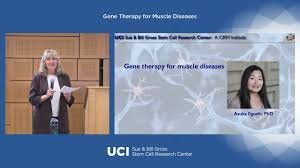Overview
Our research was inspired by patients highlighting that we have little information on how gene therapy for Duchenne muscular dystrophy affects the heart. Since mouse models of Duchenne muscular dystrophy do not manifest the same heart problems experienced in patients, we decided to use human cells in a dish to study features of disease. The platform that we use converts blood cells to stem cells that have the potential to become any cell type, including heart cells. These human heart cells have the same genetic makeup as the patient, enabling us to study how dystrophin deficiency affects heart cell function. Characteristics, like poor contraction and irregular heart beats, can be observed in a petri dish. By screening different therapeutic agents, we can assess whether they have any effect on improving the function of diseased cells.
Comparison of Microdystrophin Gene Therapy
We are comparing the design of gene therapy products for the treatment of Duchenne muscular dystrophy with respect to the heart. We convert stem cells to heart cells to study healthy and diseased states. We have found that microdystrophin gene therapy partially rescues some of the disease characteristics we observe in the Duchenne heart cells.
Future Directions
The next steps in our research is to design new gene therapy strategies that could have a stronger impact on delaying heart failure in Duchenne muscular dystrophy.
Patient Contributions
Thanks to increased patient involvement in providing materials for research, whether it be blood donations for making stem cells, sharing their medical records with organizations like the Muscular Dystrophy Association, or completing quality of life surveys, we have more information to accelerate the development of treatments for neuromuscular diseases. These resources highlight the needs of patients and shape the trajectory of our research.
Asuka Eguchi, Ph.D.
Assistant ProfessorDepartment of Physiology and BiophysicsSue & Bill Gross Stem Cell Research CenterUniversity of California, Irvine✉️ asuka.eguchi at uci.edu
